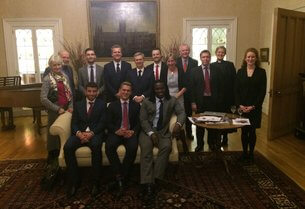Anglican churches in central and eastern Africa, including Burundi, the Democratic Republic of Congo, Kenya, Rwanda and South Sudan, are keen to use sports to improve education, empower young people, tackle gender inequality and resolve conflict.
Archbishop of Canterbury Justin Welby gave his backing to the emerging initiative at a consultation on 8 December at Lambeth Palace that brought together church leaders, Alliance staff, active and former elite professional footballers, sport for development practitioners and representatives of Christian charities.
“Football is a universal language of countries. It’s everywhere and it’s a [point] of meeting and drawing people together,” said Archbishop Justin.
He talked about the difference it had made in a Coventry Cathedral Centre for Reconciliation project in a conflict-hit area of Nigeria to provide training in peace building before footballers played a match.
“Football is the world’s most popular sport with an enormous potential to be used for social, spiritual and economic development. Football engages and excites people across the divides of national, regional, racial, religious, ethnic, gender, age, ability, social and economic differences,” commented the Revd Andy Bowerman, Anglican Alliance Co-Executive Director.
The aim is to have regional consultation on football for reconciliation and development in Central and East Africa.
“I hope that out of this evening we can develop something that goes with sport and goes with reconciliation and peacemaking,” Archbishop Justin said.
Bishop Moses Nthukah of the Diocese of Mbeere recounted how this is already happening in Kenya. What started as a pilot “football for development” league grew to more than 30 teams within a matter of weeks.
The diocesan programme’s training for coaches and referees includes modules from the Anglican Alliance Agents of Change course. The league has generated ideas on how to alleviate poverty, empower people economically and build cohesion in the community. Connections with elite footballers from the Kenyan national team have led to generous support from corporate sponsors.
Football has also been used as a tool to empower women and end gender-based violence and inequality, Andy said.
In post-genocide Rwanda, Anglican Felicité Rwemalika has increased women’s income and skills and thus their ability to transform their lives and communities by getting them to play football.
In her beauty salon she encountered many women who were traumatised by the genocide.
“Women are the most vulnerable after the genocide. They were raped several times, their husbands left them, they were killed, children were killed, and they didn’t have hope for the future,” she says.
So she decided to do something to “change their mindset”.
The desire for change overcame resistance to the idea of women playing football and Felicité was able to persuade the city of Kigali to support girls’ football teams and even pay them a wage which enabled them to stay in school. Her organisation AKWOS creates farming cooperatives from women’s football teams as a entrepreneurial initiative.
“Participation in sport is a powerful tool for addressing gender inequality, and by engaging boys and men and girls and women together through football, we can target harmful social attitudes and empower people to speak out within their communities,” Andy noted.
Kathy McQueen of the Christian charity Flame International spoke of the vision of an Anglican priest in DRC for transformation through sports at a school for orphans. “[Canon Désiré Mukaniwra of Goma wanted] to educate them and for them to have their own football team and their own laptops.”
She spoke of the huge needs in DRC – particularly Goma, “one of the most traumatised places on earth” – where 40 per cent of the women have been raped.
“If there is going to be peace in society, then it has to start with peace in your own lives. The government of the Congo invest heavily in football … I know that football has got the potential for change and there is a universal connectivity, with the ability to inspire and change.”
“In situations of open or dormant conflict, sport can act as a connector between communities and peoples and hence plays an important role in maintaining open channels of communication,” Andy said.
It provides a healthy outlet for tensions and can contribute to managing trauma after natural disasters or violence in refugee camps, for instance in South Sudan, he added.
“Perhaps football’s main contribution to conflict resolution is its universality; it crosses frontiers inspiring and motivating children.”
The football for reconciliation and development initiative plans to focus on researching and mapping existing programmes, networking and articulating the Church’s distinct role in football in development, and envisions holding a regional consultation at a future date.
– Contact the Anglican Alliance for more information or to be part of the mapping: anglicanalliance@aco.org.
Photo: Football for reconciliation and development consultation. Credit: Anglican Alliance

